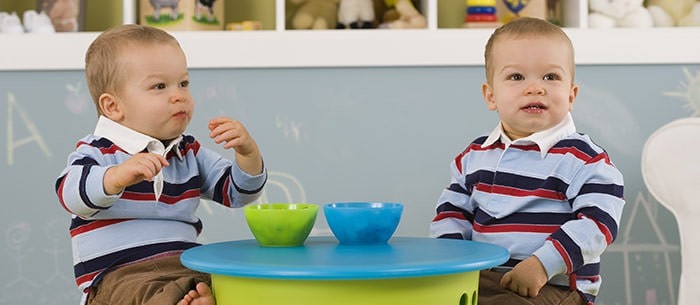Twins — are they two times the trouble?
That’s the question that Stephanie Grant, a nanny from Seattle, wondered as she evaluated a job ad. The family sounded wonderful, the hours and pay were ideal and her qualifications matched what the family was looking for. But was she up to the challenge of caring for several kids at once?
Many sitters may ask themselves the exact same thing. But while babysitting for families with twins does have some specific challenges, it can also have double the rewards.
Here are five tips for getting a job babysitting twins and multiples — and tips to help you care for them.
- Target Twin Families
If you’re open to working with multiple birth families or have previous experience doing so, mention that specifically in your job profile, recommends Natalie Diaz, founder of Twiniversity and author of What To Do When You’re Having Two. Parents of twins or multiples on the lookout for care are going to gravitate toward your advertisement and expertise.Grant agrees. “Families with multiples are anxious to find people that understand the specific strain that comes with that. Since working with my first family with twins, I’ve connected with several other parents through that network and based on my prior work.”
- Mention Previous Multiples Experience
Diaz advises prospective caretakers to follow their usual approach to connecting with families. One thing that may be helpful, however, is to share any previous multiples experience or connections. Even if it’s the fact that one of your siblings was a multiple or you once briefly cared for multiples, it can help create an instant connection.
- Avoid Assumptions
Once you get a job interview or the actual job, don’t assume that the challenges you’ll face are profoundly different from caring for other families.“If you have previous experience working for families with multiple children close in age, caring for twins may not be all that different,” says Grant. “It’s important to bring the same skills to the table that you always use, from entertaining children to monitoring safety to communicating with parents.”
Still, it’s important to ask parents questions about how their children interact and are treated. Don’t assume that just because children are twins that they have the same bedtime routine, food preferences or favorite activities. “Ask in the same way you would if you were caring for a family with older children and younger children,” suggests Grant.
- Understand the Extra Strain on Families
Multiple birth families are often even more stressed than other families. Sleep deprivation and financial strain may be significant, as medical bills and ordinary day-to-day supplies, such as diapers, doubles with the addition of a second infant. As a result, families with multiples may have more constrained budgets. Be aware of that when negotiating salary, but make sure you’re being paid fairly for the responsibilities.
- Don’t Try to Take Over
The parents of multiples, especially very young multiples and those with other children already in the family, are stretched thin. Wanting to pitch in and help in any way possible is going to be highly appreciated. But it’s important to remember not to try to take over. Instead, says Diaz, go in as a family partner.Grant agrees, “It’s great to offer help wherever you can. But always do so within the bounds of what mom and dad are comfortable with. If mom always wants to feed the babies, maybe you can be more useful by running to the grocery store, doing the babies’ laundry or simply caring for the infant that’s not being fed. Follow the parents’ lead.”
Offering care in a multiple birth family setting is exciting, exhausting and highly rewarding. If you’re a high energy and organized person that loves engaging with children and taking things off parents’ plates, it could be a good fit. Ask the right questions and you’ll find a family that’s anxious to embrace you.
Liz Alton is a freelance writer covering small business and technology topics. Her writing can be found in USA Today, The Huffington Post and many other publications.





